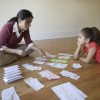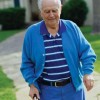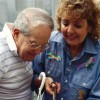 It’s easy to say that financial problems, such as losing your job, should be shared with your family. But it’s hard to know just how to do that. One method of bringing the family together with a feeling of team spirit is a family council meeting. This is a simple strategy for bringing a harmonious pattern into the family routine. This 2-page fact sheet was published by the UF Department of Family Youth and Community Sciences, December 2012.
It’s easy to say that financial problems, such as losing your job, should be shared with your family. But it’s hard to know just how to do that. One method of bringing the family together with a feeling of team spirit is a family council meeting. This is a simple strategy for bringing a harmonious pattern into the family routine. This 2-page fact sheet was published by the UF Department of Family Youth and Community Sciences, December 2012.
http://edis.ifas.ufl.edu/fy227
Tag: Martie Gillen
Women and Money: Unique Issues – Finances in a Divorce (FCS7247/FY1349)
 Separation and divorce impact family financial management on multiple levels. Women going through a divorce will have reduced resources and the added expenses of the divorce process. If you are going through a divorce, you should carefully examine the financial factors listed in this publication. Also, you should know that sensible planning may help to lessen the financial stress associated with the transition from marriage to divorce. This 7-page fact sheet was written by Lynda Spence, Martie Gillen, and Diann Douglas, and published by the UF Department of Family Youth and Community Sciences, January 2013.
Separation and divorce impact family financial management on multiple levels. Women going through a divorce will have reduced resources and the added expenses of the divorce process. If you are going through a divorce, you should carefully examine the financial factors listed in this publication. Also, you should know that sensible planning may help to lessen the financial stress associated with the transition from marriage to divorce. This 7-page fact sheet was written by Lynda Spence, Martie Gillen, and Diann Douglas, and published by the UF Department of Family Youth and Community Sciences, January 2013.
http://edis.ifas.ufl.edu/fy1349
Designing Educational Programs for Older Adults (FCS2216/FY631)
 This 4-page fact sheet discusses marketing to older adults, location and timing of programs, and how to successfully share information with older adults. Written by Martie Gillen, Carolyn Wilken, and Jenny Jump, and published by the UF Department of Family Youth and Community Sciences, November 2012.
This 4-page fact sheet discusses marketing to older adults, location and timing of programs, and how to successfully share information with older adults. Written by Martie Gillen, Carolyn Wilken, and Jenny Jump, and published by the UF Department of Family Youth and Community Sciences, November 2012.
http://edis.ifas.ufl.edu/fy631
Adapting the Home (FCS2215/FY630)
 This 4-page fact sheet discusses AARP’s 10 basic ideas to increase home safety, how to individualize for each person or activity, how to apply universal design to make homes safer, and assistive devices. Written by Martie Gillen, Pat J. Dasler, and Jenny Jump, and published by the UF Department of Family Youth and Community Sciences, November 2012.
This 4-page fact sheet discusses AARP’s 10 basic ideas to increase home safety, how to individualize for each person or activity, how to apply universal design to make homes safer, and assistive devices. Written by Martie Gillen, Pat J. Dasler, and Jenny Jump, and published by the UF Department of Family Youth and Community Sciences, November 2012.
http://edis.ifas.ufl.edu/fy630
Fall Prevention (FCS2214/FY629)
 Among older adults (those 65 or older), falls are the leading cause of injury and death. When someone falls, they face long-term disability, lower productivity, and loss of independence. Falls can happen anywhere, but more than half of all falls happen at home. Many of these falls could be prevented by making simple changes in the home. This 3-page fact sheet was written by Martie Gillen, Kristen D. Smith, and Jenny Jump, and published by the UF Department of Family Youth and Community Sciences, November 2012.
Among older adults (those 65 or older), falls are the leading cause of injury and death. When someone falls, they face long-term disability, lower productivity, and loss of independence. Falls can happen anywhere, but more than half of all falls happen at home. Many of these falls could be prevented by making simple changes in the home. This 3-page fact sheet was written by Martie Gillen, Kristen D. Smith, and Jenny Jump, and published by the UF Department of Family Youth and Community Sciences, November 2012.
http://edis.ifas.ufl.edu/fy629
Financial Issues (FCS2212/FY627)
 Although we cannot foresee unexpected events, planning can help us control some financial issues that may arise. This 4-page fact sheet highlights the main financial poblems older adults face during retirements, and solutions to help plan and manage a successful retirement. Written by Martie Gillen and Josephine Turner, and published by the UF Department of Family Youth and Community Sciences, November 2012.
Although we cannot foresee unexpected events, planning can help us control some financial issues that may arise. This 4-page fact sheet highlights the main financial poblems older adults face during retirements, and solutions to help plan and manage a successful retirement. Written by Martie Gillen and Josephine Turner, and published by the UF Department of Family Youth and Community Sciences, November 2012.
http://edis.ifas.ufl.edu/fy627
Safe Return (FCS2211/FY626)
 In the United States, more than 10,000 times each year a person with dementia becomes lost in the community and cannot find the way home. The quality of care people receive does not influence the likelihood of people with dementia to become lost. Even people who live in the best caregiving situations can become lost in the community. It can happen to anyone, even if the person does not have a tendency to wander. This 4-page fact sheet looks at why people with dementia become lost, how to prevent this from happening, and identify the best search strategies for finding someone who is lost. Written by Martie Gillen and Meredeth A. Rowe, and published by the UF Department of Family Youth and Community Sciences, November 2012.
In the United States, more than 10,000 times each year a person with dementia becomes lost in the community and cannot find the way home. The quality of care people receive does not influence the likelihood of people with dementia to become lost. Even people who live in the best caregiving situations can become lost in the community. It can happen to anyone, even if the person does not have a tendency to wander. This 4-page fact sheet looks at why people with dementia become lost, how to prevent this from happening, and identify the best search strategies for finding someone who is lost. Written by Martie Gillen and Meredeth A. Rowe, and published by the UF Department of Family Youth and Community Sciences, November 2012.
http://edis.ifas.ufl.edu/fy626
Family Relationships in an Aging Society (FCS2210/FY625)
 Never in the history of America or the world has the population had more older adults than children. This 5-page fact sheet discusses some issues that happen as a result of having a greater number of older adults than children. It also looks at the roles of the family and intergenerational relationships supporting our aging society. Written by Martie Gillen, Terry Mills, and Jenny Jump, and published by the UF Department of Family Youth and Community Sciences, November 2012.
Never in the history of America or the world has the population had more older adults than children. This 5-page fact sheet discusses some issues that happen as a result of having a greater number of older adults than children. It also looks at the roles of the family and intergenerational relationships supporting our aging society. Written by Martie Gillen, Terry Mills, and Jenny Jump, and published by the UF Department of Family Youth and Community Sciences, November 2012.
http://edis.ifas.ufl.edu/fy625
Contact Organization for Caregivers (FCS2258/FY870)
 As an older adult or caregiver for an older adult, you may need to contact multiple agencies and offices if you are seeking medical care. It helps to be organized when you contact these agencies so you know what questions to ask and have somewhere to write down the answers. This worksheet provides a contact form that will help you keep track of your conversations. This 3-page fact sheet was written by Martie Gillen and Carolyn S. Wilken, and published by the UF Department of Family Youth and Community Sciences, August 2012. http://edis.ifas.ufl.edu/fy870
As an older adult or caregiver for an older adult, you may need to contact multiple agencies and offices if you are seeking medical care. It helps to be organized when you contact these agencies so you know what questions to ask and have somewhere to write down the answers. This worksheet provides a contact form that will help you keep track of your conversations. This 3-page fact sheet was written by Martie Gillen and Carolyn S. Wilken, and published by the UF Department of Family Youth and Community Sciences, August 2012. http://edis.ifas.ufl.edu/fy870
Ethical Issues in Building and Maintaining Coalitions: A 10-Step Decision-Making Model for Choosing between Right and Right (FCS9203/FY664)
 Coalitions form in communities to address complex issues and to take advantage of the resources and expertise of diverse people and groups. Sometimes coalitions may face difficult ethical dilemmas, and it helps for all members of the coalition to be aware of these issues. Learn about the 10-Step Decision-Making Model to use when making ethical decisions. This 8-page fact sheet was written by Martie Gillen, Carolyn S. Wilken, and Katey Walker, and published by the UF Department of Family, Youth, and Community Sciences, August 2012. http://edis.ifas.ufl.edu/fy664
Coalitions form in communities to address complex issues and to take advantage of the resources and expertise of diverse people and groups. Sometimes coalitions may face difficult ethical dilemmas, and it helps for all members of the coalition to be aware of these issues. Learn about the 10-Step Decision-Making Model to use when making ethical decisions. This 8-page fact sheet was written by Martie Gillen, Carolyn S. Wilken, and Katey Walker, and published by the UF Department of Family, Youth, and Community Sciences, August 2012. http://edis.ifas.ufl.edu/fy664
Balancing Work and Caregiving: A Guide for Employers (FCS2261/FY873)
 Over 4 million people in Florida care for older family members or friends, and these people often must balance work and home responsibilities. Employers need to be aware of how to support their employees who are also caregivers. This could include support programs for caregivers, flexible schedules, or other work accommodations. This 3-page fact sheet was written by Martie Gillen and Carolyn S. Wilken, and published by the UF Department of Family, Youth, and Community Sciences, August 2012. http://edis.ifas.ufl.edu/fy873
Over 4 million people in Florida care for older family members or friends, and these people often must balance work and home responsibilities. Employers need to be aware of how to support their employees who are also caregivers. This could include support programs for caregivers, flexible schedules, or other work accommodations. This 3-page fact sheet was written by Martie Gillen and Carolyn S. Wilken, and published by the UF Department of Family, Youth, and Community Sciences, August 2012. http://edis.ifas.ufl.edu/fy873
Doctor Appointment Checklist (FCS2236/FY746)
 When you have a doctor appointment, you should make the most of your time with the doctor. This worksheet will help you remember what questions you want to ask and give you a space to take notes. This document is also beneficial if you are a caregiver for an older adult and go along to appointments. This 5-page fact sheet was written by Martie Gillen and Carolyn S. Wilken, and published by the UF Department of Family, Youth, and Community Sciences, August 2012. http://edis.ifas.ufl.edu/fy746
When you have a doctor appointment, you should make the most of your time with the doctor. This worksheet will help you remember what questions you want to ask and give you a space to take notes. This document is also beneficial if you are a caregiver for an older adult and go along to appointments. This 5-page fact sheet was written by Martie Gillen and Carolyn S. Wilken, and published by the UF Department of Family, Youth, and Community Sciences, August 2012. http://edis.ifas.ufl.edu/fy746
Questions to Ask Before Agreeing to Surgery (FCS2235/FY745)
 Before you agree to have surgery, you need to be aware of the risks and benefits. The best way to do this is to discuss the surgery with your doctor. Use this worksheet to ask questions and take notes so that you have all the information you need. This 3-page fact sheet was written by Martie Gillen and Carolyn S. Wilken, and published by the UF Department of Family, Youth, and Community Sciences, August 2012. http://edis.ifas.ufl.edu/fy745
Before you agree to have surgery, you need to be aware of the risks and benefits. The best way to do this is to discuss the surgery with your doctor. Use this worksheet to ask questions and take notes so that you have all the information you need. This 3-page fact sheet was written by Martie Gillen and Carolyn S. Wilken, and published by the UF Department of Family, Youth, and Community Sciences, August 2012. http://edis.ifas.ufl.edu/fy745
Final Wishes: End-of-Life Decisions (FCS2262/FY874)
 As you grow older, you should discuss your final wishes with your family members so they will know what type of medical care you will want. The Five Wishes program and brochure present an easy way to communicate these decisions to your family and create a legal document. This 3-page fact sheet was written by Martie Gillen and Carolyn S. Wilken, and published by the UF Department of Family, Youth, and Community Sciences, August 2012. http://edis.ifas.ufl.edu/fy874
As you grow older, you should discuss your final wishes with your family members so they will know what type of medical care you will want. The Five Wishes program and brochure present an easy way to communicate these decisions to your family and create a legal document. This 3-page fact sheet was written by Martie Gillen and Carolyn S. Wilken, and published by the UF Department of Family, Youth, and Community Sciences, August 2012. http://edis.ifas.ufl.edu/fy874
Home Buying and Your Credit Report (FCS3217/HE714)
 Before you purchase a house, you need to look over your credit report. Your credit history will affect whether or not a bank will give you a loan, as well as the interest rate you will be charged. This 3-page fact sheet was written by Martie Gillen and Virginia Peart, and published by the UF Department of Family Youth and Community Sciences, July 2012.
Before you purchase a house, you need to look over your credit report. Your credit history will affect whether or not a bank will give you a loan, as well as the interest rate you will be charged. This 3-page fact sheet was written by Martie Gillen and Virginia Peart, and published by the UF Department of Family Youth and Community Sciences, July 2012.
http://edis.ifas.ufl.edu/he714
The Future of Aging Is Florida (FCS2209/FY624)
 Aging is not only about older adults. It is about their families, the community they live in, and the influence they exert on our society. Changing demographics have made the study of aging increasingly important. This 5-page fact sheet offers possible solutions to some of the issues we face as we “age in the 21st Century.” Written by Martie Gillen and Jeffrey W. Dwyer, and published by the UF Department of Family Youth and Community Sciences, July 2012.
Aging is not only about older adults. It is about their families, the community they live in, and the influence they exert on our society. Changing demographics have made the study of aging increasingly important. This 5-page fact sheet offers possible solutions to some of the issues we face as we “age in the 21st Century.” Written by Martie Gillen and Jeffrey W. Dwyer, and published by the UF Department of Family Youth and Community Sciences, July 2012.
http://edis.ifas.ufl.edu/fy624
Employer Sponsored Retirement Savings Plans (FCS5258b/FY1286)
 A financially secure retirement is a goal for many workers, and the ability to achieve that plan can be helped by employer-sponsored retirement plans. Learn more in this 3-page fact sheet written by Rachel Dorman, Lisa M. Leslie, Michael S. Gutter, Martie Gillen, and Josephine Turner, and published by the UF Department of Family Youth and Community Sciences, April 2012.
A financially secure retirement is a goal for many workers, and the ability to achieve that plan can be helped by employer-sponsored retirement plans. Learn more in this 3-page fact sheet written by Rachel Dorman, Lisa M. Leslie, Michael S. Gutter, Martie Gillen, and Josephine Turner, and published by the UF Department of Family Youth and Community Sciences, April 2012.
http://edis.ifas.ufl.edu/fy1286
Individual Retirement Accounts (FCS5258/FY642)
 An individual retirement account (IRA) is a good tool to build retirement funds. This type of account has been offered since 1974 and comes with special tax advantages. An IRA can be opened through a financial institution such as a bank, credit union, mutual fund company, or brokerage firm. Learn more in this 4-page fact sheet written by Rachel Dorman, Lisa M. Leslie, Michael S. Gutter, Martie Gillen, and Josephine Turner, and published by the UF Department of Family Youth and Community Sciences, April 2012.
An individual retirement account (IRA) is a good tool to build retirement funds. This type of account has been offered since 1974 and comes with special tax advantages. An IRA can be opened through a financial institution such as a bank, credit union, mutual fund company, or brokerage firm. Learn more in this 4-page fact sheet written by Rachel Dorman, Lisa M. Leslie, Michael S. Gutter, Martie Gillen, and Josephine Turner, and published by the UF Department of Family Youth and Community Sciences, April 2012.
http://edis.ifas.ufl.edu/fy642
Estate Planning: Your Will (FCS5241/FY540)
 A will is considered to be the cornerstone of most estate plans. A will is a written legal document that takes effect at death, and is used to administer the estate, including transferring property ownership and making provisions for the care of minor or dependent children. This 4-page fact sheet was written by Martie Gillen and Josephine Turner, and published by the UF Department of Family Youth and Community Sciences, March 2012. http://edis.ifas.ufl.edu/fy540
A will is considered to be the cornerstone of most estate plans. A will is a written legal document that takes effect at death, and is used to administer the estate, including transferring property ownership and making provisions for the care of minor or dependent children. This 4-page fact sheet was written by Martie Gillen and Josephine Turner, and published by the UF Department of Family Youth and Community Sciences, March 2012. http://edis.ifas.ufl.edu/fy540
Estate Planning (FCS7207/FY446)
 Estate planning has to do with living, not just with decisions about who inherits property. An estate plan is a pattern, a guide, or a master method for working toward financial security and the family’s future welfare. To be most effective, estate planning should involve all members of the family. The objectives of estate planning will differ among families because of varying circumstances, such as differences in assets, value judgments, personal desires, and number of children. Consider these purposes for estate planning. This 7-page fact sheet was written by Martie Gillen, Josephine Turner, and Vervil Mitchell, and published by the UF Department of Family Youth and Community Sciences, March 2012.
Estate planning has to do with living, not just with decisions about who inherits property. An estate plan is a pattern, a guide, or a master method for working toward financial security and the family’s future welfare. To be most effective, estate planning should involve all members of the family. The objectives of estate planning will differ among families because of varying circumstances, such as differences in assets, value judgments, personal desires, and number of children. Consider these purposes for estate planning. This 7-page fact sheet was written by Martie Gillen, Josephine Turner, and Vervil Mitchell, and published by the UF Department of Family Youth and Community Sciences, March 2012.
http://edis.ifas.ufl.edu/fy446